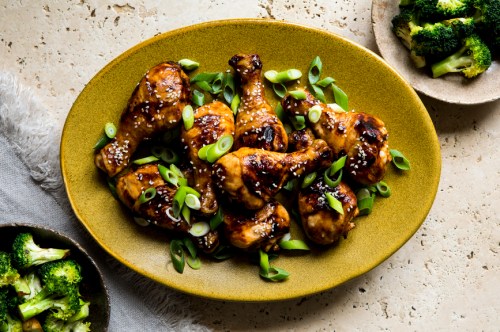Jamaican Jerk Seasoning Is Anti-Inflammatory and Great for Your Gut—Here’s How To Make It
Here, a dietitian shares the top health benefits of Jamaican jerk seasoning, plus find an easy recipe to try the delicious marinade at home.

Wherever I am in the world, when I tell folks where I’m from, they almost always reply in utter appreciation for Jamaican jerk seasoning. That’s the transportive power of this Caribbean marinade and its distinctive, memorable taste. Native to Jamaica, jerk, as a singular term, refers to how meat is seasoned, grilled, and smoked. Chicken and pork are the most common meats in jerk dishes, however, seafood, veggies, and even tofu can be “jerked” for plant-based folks like myself.
Experts in This Article
registered dietitian and founder of Axelrod Nutrition
Growing up, I remember my grandmother sharing stories on the history of jerk, and taking pride in being Afro-Indigenous, as it’s been said that the origins of Jamaican jerk seasoning can be traced to the native Arawak Indians who flavored pork with allspice before smoking it. As foreign settlers made their way to the island, and as its population and demographics grew, so did the list of ingredients in jerk. At a certain point, escaped enslaved people, better known as Maroons, introduced their practice for slow-roasting meat in fire pits, and this ushered in the cooking technique still commonly used today known as “jerk pits.”
Jerk seasoning has been a culinary staple of Jamaica and its diasporas, located primarily in Canada, the United Kingdom, and the United States for centuries. It’s just as beloved for its robust aromas as it is for its impressive array of health benefits, derived from its unique blend of herbs and spices.
What is Jamaican jerk seasoning?
Historically, jerk seasoning is made from bird peppers, pepper elder, and allspice, whereas modern-day recipes include broader ingredients, including garlic, cinnamon, nutmeg, ginger, scallions, and thyme. “Jerk seasoning and its origins truly pique my interest, from its history to how versatile, yet so specific, it is—it’s incredible,” says Boris Ginet, chef and owner of Risbo in Brooklyn, New York.
Traditionally, “jerk is neither mild nor subtle,” Ginet adds. “Scotch bonnet will hit your palette first. The allspice compliments the heat with a bitter, yet fruity, taste, while the garlic, ginger, scallions, and thyme are surrounding notes that are warm with smokiness, but also have sweet undertones that pull through to compliment the overall taste.”
The health benefits of Jamaican jerk seasoning
I still remember so vividly smelling the fresh ginger, garlic, onions, and allspice blending so beautifully together as my grandmother prepared jerk chicken for family dinners. As a holistic practitioner, she always made sure I knew the health properties of everything we ate. Most spices and herbs are packed with minerals and nutrients, and the ingredients in jerk seasoning are no exception, says Sydney Axelrod, RD, CDN, a dietitian, and founder of Axelrod Nutrition.
For example, Axelrod says allspice, a star ingredient in jerk seasoning, is rich in a variety of plant compounds like eugenol, which is praised for its potent antibacterial and antifungal properties, as well as quercetin—a type of antioxidant known as flavonoid that fights free radicals, and finally gallic acid, another powerful antioxidant.
Every ingredient in Jamaican jerk seasoning provides a different health perk, Axelrod continues. “Garlic has been shown to boost immunity and acts as an anti-inflammatory,” she says. “Cinnamon and its antioxidant compound, cinnamaldehyde, can reduce inflammation; thyme contains a variety of minerals and vitamins that promote good health, including vitamin C for immune support, potassium for healthy cells, and manganese for bone development; and clove, also rich in manganese, reduces inflammation and aids in digestion.”
So when you’re in the mood for island cuisine and fancy making an easy jerk dish for you or your family, know you’re reaping health benefits in every bite. I’d start with this marinade recipe below, which you can slather on anything from chicken to plant-based proteins like tofu or seitan.
Jamaican Jerk Marinade Recipe
Ingredients3 sprigs fresh thyme2 spring onions8 pimento (allspice) seeds1–2 scotch bonnet peppers (depends on the amount of spice you prefer)1 scallion1/2 large white onion8 garlic cloves1 tsp nutmeg1 tsp cinnamon1 tsp black pepper1 tsp brown sugar1/2 tsp lemon juice2 Tbsp white vinegar1 1/2 Tbsp olive oil
1. In a food processor, combine all the ingredients. Increase the heat level to taste with more peppers. Store in a glass, airtight jar for up to two weeks.
Want to prolong your marinade? Freeze it and keep it for up to six months.
Oh hi! You look like someone who loves free workouts, discounts for cutting-edge wellness brands, and exclusive Well+Good content. Sign up for Well+, our online community of wellness insiders, and unlock your rewards instantly.
Sign Up for Our Daily Newsletter
Get all the latest in wellness, trends, food, fitness, beauty, and more delivered right to your inbox.
Got it, you've been added to our email list.










